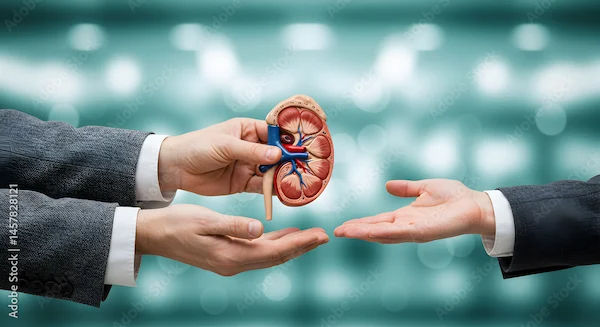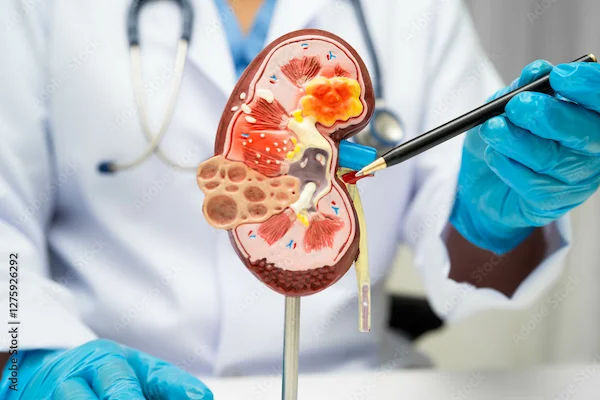After Kidney Transplant
Navigating life after a kidney transplant? Learn about recovery, lifelong medications, lifestyle adjustments, follow-up care, and what to expect for a healthy future.

Written by
Last updated on 14th Jul, 2025
_2.webp?tr=q-80,f-webp,w-350,dpr-2,c-at_max 700w)
Introduction
Congratulations on your kidney transplant! This is a significant milestone in your journey toward better health. However, the road to recovery doesn’t end with the surgery—it’s just the beginning of a new chapter. In this article, we’ll guide you through what to expect after a kidney transplant, how to take care of yourself, and ways to ensure your new kidney stays healthy for years to come.
What Happens Right After the Transplant?
After your kidney transplant, you’ll spend a few days in the hospital for close monitoring. Your medical team will check:
Kidney function – Blood tests will ensure your new kidney is working well.
Signs of rejection – Your body may see the new kidney as a foreign object and try to attack it. Medications will help prevent this.
Infections – Since you’ll be on immunosuppressants (medicines that lower your immune system), infections can be a risk.
Once your doctors are satisfied with your progress, you’ll be discharged with a detailed care plan.
Medications: Your Lifeline After Transplant
One of the most crucial aspects of posttransplant care is taking your medications exactly as prescribed. The main types include:
Immunosuppressants (Anti-Rejection Drugs) – These prevent your body from rejecting the new kidney. Common ones include tacrolimus, cyclosporine, and mycophenolate.
Anti-infective drugs – Since your immune system is weaker, you may need antibiotics or antivirals to prevent infections.
Blood pressure and cholesterol medications – Transplant patients often need these to protect their heart and kidneys.
Never skip or adjust doses without consulting your doctor! Missing even a single dose can increase the risk of rejection.
Possible Side Effects of Medications
While these drugs are essential, they can sometimes cause side effects, such as:
Weight gain (due to steroids)
High blood pressure
Increased risk of infections
Diabetes or high cholesterol
If you notice any unusual symptoms, inform your transplant team immediately.
Diet and Nutrition After a Kidney Transplant
Eating a balanced diet helps your new kidney function well. Here are some key tips:
Eat plenty of fruits and vegetables – They provide essential vitamins and fiber.
Choose lean proteins – Fish, chicken, eggs, and beans help with healing.
Limit salt and processed foods – Too much salt can raise blood pressure.
Stay hydrated – Drink enough water unless your doctor advises otherwise.
Avoid grapefruit and pomegranate – They can interfere with immunosuppressants.
Your doctor or a dietitian may give you a personalized meal plan based on your lab results.
Consult Top Specialists for Personalised Tips
Exercise and Physical Activity
Staying active is important for recovery, but start slow:
Walking is a great way to begin.
Gradually increase activity as you regain strength.
Avoid heavy lifting for the first few months to prevent strain on the incision site.
Always check with your doctor before starting any new exercise routine.
Monitoring for Complications
Even with careful management, some complications can arise. Watch for:
Signs of Rejection:
Fever
Swelling or pain near the transplant site
Decreased urine output
High blood pressure
Signs of Infection:
Fever or chills
Cough or shortness of breath
Redness or pus at the incision site
Other Issues:
Unusual weight gain (could indicate fluid retention)
High blood sugar (a side effect of steroids)
If you notice any of these, contact your transplant team right away.
Mental and Emotional Wellbeing
A kidney transplant is a lifechanging event, and it’s normal to feel a mix of emotions—relief, anxiety, or even guilt. Here’s how to cope:
Talk to a counselor or support group – Sharing your feelings can help.
Stay connected with loved ones – Emotional support is crucial.
Practice relaxation techniques – Meditation or light yoga can reduce stress.
Long-Term Follow-Up Care
Regular checkups are essential to monitor your kidney function and overall health. You’ll need:
Frequent blood tests
Urine tests
Blood pressure checks
Medication adjustments (if needed)
Your transplant team will guide you on how often you need visits.
When to Seek Emergency Help
Call your doctor immediately if you experience:
Sudden high fever
Severe pain near the transplant site
Difficulty breathing
No urine output for 12+ hours
Final Thoughts
A kidney transplant gives you a new lease on life, but it requires lifelong care. By taking your medications, eating well, staying active, and keeping up with medical appointments, you can enjoy a healthy and fulfilling life. If you have any concerns or need expert advice, Apollo 24|7 is here to help. You can book a consultation with a nephrologist or schedule followup tests through our app or website.
Consult Top Nephrologist
Consult Top Specialists for Personalised Tips
Dr Ch Sashidhar
Nephrologist
20 Years • MBBS, MD General Medicine, DNB, Nephrology
Secunderabad
Apollo Hospitals Secunderabad, Secunderabad

Dr Praveen Kumar Etta
Nephrologist
10 Years • MBBS,MD DM(SGPGI) FORMER ASST(PIMS)
Hyderabad
Apollo Spectra Ameerpet, Hyderabad

Dr. Pardha Saradhi
Nephrologist
9 Years • MBBS, MD-DNB (Gen. Med.), DNB (Nephro)
Hyderabad
Apollo Hospitals D R D O kanchanbagh, Hyderabad
(50+ Patients)

Dr. Aswini Kumar Panigrahi
Nephrologist
23 Years • MBBS, MD (Int. Med.), DNB Nephro
Hyderabad
Apollo Hospitals Jubilee Hills, Hyderabad
(200+ Patients)

Dr. Manju Kamal
Nephrologist
12 Years • MBBS,MD(General Medicine), DNB,DM(Nephrology)
Angamaly
Apollo Hospitals Karukutty, Angamaly
Consult Top Nephrologist
Dr Ch Sashidhar
Nephrologist
20 Years • MBBS, MD General Medicine, DNB, Nephrology
Secunderabad
Apollo Hospitals Secunderabad, Secunderabad

Dr Praveen Kumar Etta
Nephrologist
10 Years • MBBS,MD DM(SGPGI) FORMER ASST(PIMS)
Hyderabad
Apollo Spectra Ameerpet, Hyderabad

Dr. Pardha Saradhi
Nephrologist
9 Years • MBBS, MD-DNB (Gen. Med.), DNB (Nephro)
Hyderabad
Apollo Hospitals D R D O kanchanbagh, Hyderabad
(50+ Patients)

Dr. Aswini Kumar Panigrahi
Nephrologist
23 Years • MBBS, MD (Int. Med.), DNB Nephro
Hyderabad
Apollo Hospitals Jubilee Hills, Hyderabad
(200+ Patients)

Dr. Manju Kamal
Nephrologist
12 Years • MBBS,MD(General Medicine), DNB,DM(Nephrology)
Angamaly
Apollo Hospitals Karukutty, Angamaly


_1.webp)
_4.webp)
_6.webp)